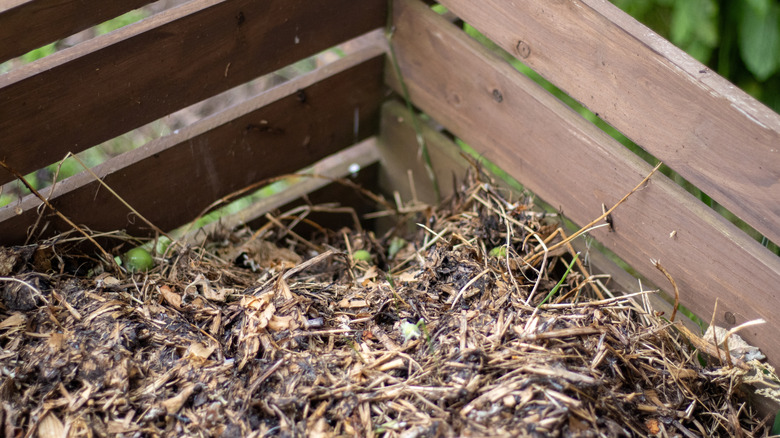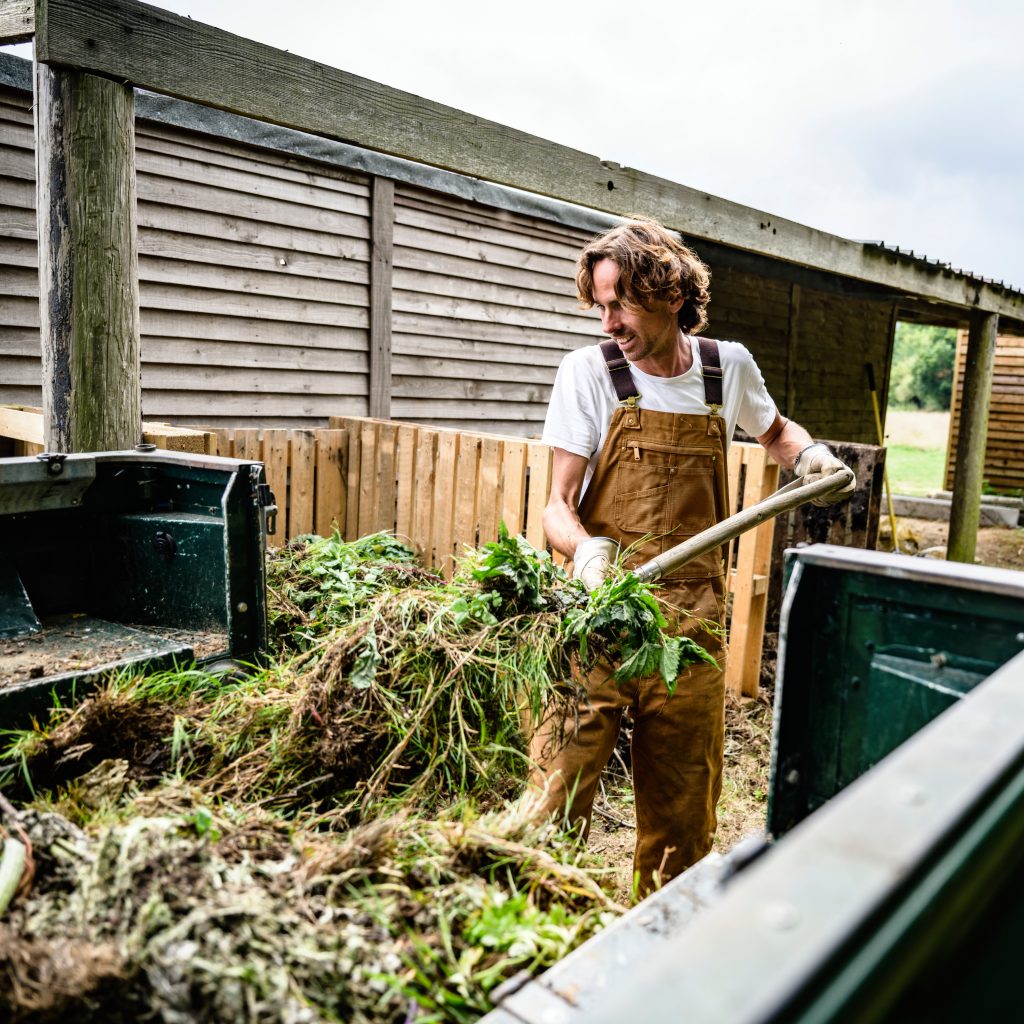Are you tired of constantly battling garden weeds and wondering if tossing them into your compost bin is a smart move? You’re not alone.
Many gardeners face the same question: can garden weeds actually help your compost, or will they just cause more trouble? Understanding the answer could save you time, protect your plants, and boost the health of your garden soil. Keep reading to discover the simple steps you can take to handle weeds in your compost the right way—and turn those pesky invaders into garden gold.
Types Of Garden Weeds
Garden weeds can grow fast and spread easily. They take nutrients from your plants. Knowing types of weeds helps manage them better.
Some weeds are harmless and easy to control. Others can harm your garden and spread quickly. Let’s look at common garden weeds and how to tell invasive ones apart.
Common Weeds In Gardens
Many weeds grow in gardens around the world. Some of the most common ones include dandelions, crabgrass, and chickweed. These weeds can take space and water from your flowers and vegetables.
- Dandelion:Bright yellow flowers with deep roots.
- Crabgrass:Spreads fast and grows in patches.
- Chickweed:Low-growing with small white flowers.
- Bindweed:Vines that wrap around plants.
- Plantain:Broad leaves and grows close to the ground.
Invasive Vs. Non-invasive Weeds
Invasive weeds spread quickly and can damage your garden’s balance. Non-invasive weeds grow slowly and stay in one place. It is important to know which weeds are invasive before adding them to compost.
| Weed Type | Description | Example |
| Invasive | Spreads fast, hard to control, harms other plants. | Bindweed, Japanese Knotweed |
| Non-invasive | Grows slowly, easier to manage, less harmful. | Dandelion, Chickweed |
Composting Basics
Composting is a natural way to turn garden waste into rich soil. It helps reduce trash and improves plant growth.
You can compost many things, but some require care. Knowing what to add and how to care for your compost helps it work well.
What Goes Into A Compost Bin
You can add many garden scraps to compost. This includes leaves, vegetable peels, and grass clippings. Some weeds can go in too.
Avoid adding weeds with seeds or that have flowers. They might spread in your compost and garden. Choose weeds that have not gone to seed.
- Green materials: vegetable scraps, fresh grass, green leaves
- Brown materials: dry leaves, straw, paper, small branches
- Garden weeds without seeds or flowers
- Avoid: weeds with seeds, diseased plants, pet waste
Ideal Conditions For Composting
Compost needs air, moisture, and heat to break down well. Keep the pile damp but not soggy. Turn it often to add air.
Good compost has a mix of green and brown materials. This balance helps the compost break down faster and prevents bad smells.
- Keep compost moist like a wrung-out sponge
- Turn compost every 1-2 weeks to add air
- Mix green and brown materials in a 1:3 ratio
- Keep compost in a warm, shaded spot
Weeds And Composting
Composting is a great way to recycle garden waste. It turns organic material into nutrient-rich soil. But not all weeds are safe to add to your compost bin.
Knowing which weeds to compost helps create healthy compost. It prevents spreading unwanted seeds or diseases.
Which Weeds Are Safe To Compost
Some weeds can be safely added to your compost bin. These weeds do not harm the composting process.
- Grass clippings
- Nettle
- Comfrey
- Chickweed
These weeds break down quickly and enrich the compost. They are safe as long as they have not gone to seed.
Weeds To Avoid Adding
Certain weeds should not be added to your compost. They can spread or cause problems in your garden.
| Weed Type | Reason to Avoid |
| Bindweed | Spreads through roots |
| Ivy | Hard to decompose |
| Ground Elder | Spreads quickly |
| Couch Grass | Persistent roots |
These weeds can survive the composting process. It is best to dispose of them in other ways.

Credit: www.housedigest.com
Preventing Weed Spread
Composting garden weeds can be tricky. Weeds can spread if not managed properly. It’s important to follow some guidelines to prevent this.
With the right methods, you can compost weeds safely. This keeps your garden healthy and weed-free.
Heat And Composting
Heat is crucial in composting weeds. High temperatures can kill weed seeds and roots. This prevents them from spreading in your garden.
A compost pile should reach at least 140°F (60°C). This temperature is effective in killing most weed seeds.
- Turn the compost pile regularly
- Ensure good air circulation
- Monitor temperature with a compost thermometer
Best Practices To Kill Seeds And Roots
Managing weeds in compost involves best practices. These practices ensure seeds and roots do not survive.
Chop weeds into small pieces before adding them. This helps the compost break them down faster.
- Mix green and brown materials equally
- Keep the compost moist but not wet
- Avoid adding weeds with mature seeds
Tips For Adding Weeds To Compost
Garden weeds can be a useful addition to your compost bin. They break down and add nutrients to the soil.
It is important to handle weeds carefully to avoid spreading seeds or roots. Proper techniques help make good compost.
Chopping And Layering Techniques
Chop weeds into small pieces before adding them to the compost. Smaller pieces break down faster.
Layer chopped weeds with other compost materials. This improves air flow and speeds up decomposition.
- Cut weeds into 2-3 inch pieces
- Mix chopped weeds with dry leaves or grass clippings
- Add weeds in thin layers between other compost materials
- Turn the compost pile often to mix layers
Balancing Green And Brown Materials
Weeds count as green materials because they have moisture and nitrogen. Balance them with brown materials.
Brown materials like dry leaves and straw add carbon. A good balance helps compost break down well.
- Use about two parts brown materials for every one part green material
- Avoid adding too many fresh weeds at once
- Mix dry leaves, straw, or paper with weeds
- Keep the compost pile moist but not wet

Credit: www.reddit.com
Alternatives For Tough Weeds
Some garden weeds are hard to compost. They may have deep roots or seeds that spread easily.
This makes it risky to put them in your compost bin. Here are safer ways to handle tough weeds.
Disposal Methods
Cutting tough weeds and drying them in the sun stops them from growing. You can then throw them in the trash or burn them safely.
- Pull weeds before they seed
- Dry weeds completely before disposal
- Use a sealed bag for disposal
- Burn weeds in a safe area, if allowed
Using Weed Tea
Weed tea is a natural liquid made by soaking weeds in water. It can help kill other weeds and feed your plants.
| Step | Action |
|---|---|
| 1 | Fill a bucket with fresh weeds |
| 2 | Add water to cover the weeds |
| 3 | Let it sit for 1-2 weeks |
| 4 | Stir the mixture every few days |
| 5 | Strain the liquid and use it to water plants |
Benefits Of Composting Weeds
Composting garden weeds is a smart way to recycle unwanted plants. It turns waste into useful material for your garden.
Using weeds in compost helps reduce trash and supports healthy soil growth. It is an eco-friendly choice for gardeners.
Improving Soil Health
Weeds add nutrients back into the soil as they break down. This makes the soil richer and better for plants.
Compost with weeds improves soil structure. It helps the soil hold water and air, which plants need to grow well.
- Provides natural nutrients like nitrogen and potassium
- Increases beneficial microorganisms in the soil
- Enhances soil texture and moisture retention
Reducing Garden Waste
Putting weeds in your compost bin lowers the amount of garden waste. It stops weeds from filling up trash bags.
Composting weeds helps keep your garden clean and tidy. It also reduces the need to burn or throw away plant waste.
- Reduces trash sent to landfills
- Minimizes garden clutter
- Supports recycling of natural materials

Credit: www.epicgardening.com
Frequently Asked Questions
Can Garden Weeds Be Composted Safely?
Yes, many garden weeds can be composted safely. Avoid weeds with seeds or invasive roots to prevent spreading. Hot composting kills most seeds and pathogens, making it safer to use weed material in your compost bin.
Will Composting Kill Weed Seeds And Roots?
Hot composting (above 140°F) kills most weed seeds and roots. Cold composting may not destroy all seeds, risking weed growth when applied. Turning compost regularly ensures even heat distribution for effective seed and root elimination.
Which Garden Weeds Should Be Avoided In Compost?
Avoid composting weeds with mature seeds or invasive roots like bindweed and Bermuda grass. These can survive composting and spread in your garden. Remove seed heads before adding weeds to your compost bin to reduce risks.
How To Compost Weeds Without Spreading Them?
Use a hot composting method to kill seeds and roots. Chop weeds into small pieces for faster breakdown. Avoid adding weeds with seeds or persistent roots unless you can maintain high compost temperatures.
Conclusion
Garden weeds can go into compost, but some caution is needed. Avoid adding weeds with seeds or roots that might grow again. Chop them well to help break down faster. Keep your compost moist and turn it often for best results.
Composting weeds saves waste and helps your garden grow healthy. Remember, patience is key. Good compost makes your soil rich and plants strong. Try it carefully, and your garden will thank you.


